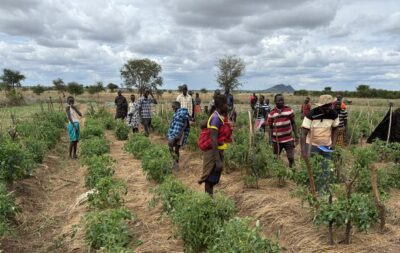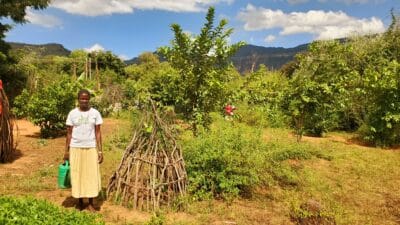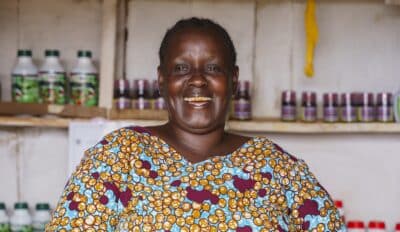Expert view
18 November 2013
It’s all about the kids (and the chickens)

Image: Kiros, one of the Ethiopian women benefitting from rearing goats provided by Farm Africa
By Nigel Harris, Farm Africa’s Chief Executive
Tigray, northern Ethiopia. A place of contrasts. Stunning scenery, amazing history, challenging lives.
I’m here to visit Farm Africa’s work but as we drive out of Axum, where St. Mary’s church is said to contain the Ark of the Covenant, I’m reminded again what a privilege it is to be a guest in another country. We pass rocky outcrops that wouldn’t be out of place in Monument Valley, churches that contain centuries of history, scenes of humanity wrestling with nature to extract a living from a beautiful but harsh environment.
I’m here to visit some of the communities we’re supporting on livestock and crops, in a new project begun this year. It’s been over a decade since we last worked in this region, but we’ve been welcomed back with open arms. Despite its persistent poverty, Tigray has a reputation for having strong community cohesion and effective local government, both of which benefit our work hugely.
But life is tough, especially for rural women. 89% of the population earn less than £2 per day. A recent survey showed that nearly 30% of women in Tigray are underweight. Women generally have limited involvement in crop production and livestock management and therefore have little or no access to foods such as milk, eggs, fruit and vegetables
We stop to meet Gihdey, a widow who has been provided with chickens. When fully grown, these chickens can produce a hundred eggs a year each. Eggs currently sell for 3 birr each – around 10p. Just 15 chickens are producing a route to better housing and a better life.
Gihdey has also joined a women’s saving group which will then provide financial support when needed. The amounts of cash available to the group are small, but potentially life-changing. We watch her feeding the chickens. No investment was ever taken so seriously.
Next up is Gabriele, who is benefiting from the classic Farm Africa model of receiving pregnant goats. Once they give birth, she will keep the kids to be reared and the mother goats will be passed on to another woman in the community, to repeat the cycle. A “women’s asset group” as it’s called in the trade.
Each adult goat can be worth up to 1000 birr; talking to the wider group, each of whom is benefiting from the scheme, we find that none have owned livestock before. Most have survived as labourers, being paid 30 birr (£1) a day. The kids provide an opportunity for a degree of security for these women-headed households.
Bee-keeping, fruit and vegetable growing complete the range of Farm Africa’s work in this area. We’re also treated to the sight of a remarkably fertile area of land outside the small town of Sero, created by some Farm Africa work on rehabilitating water gullies. The community leaders wax lyrical about the work. Much more importantly, they’ve been in charge of the work, preserving its effectiveness for some fifteen years after our original intervention.
Finally, I get to tread in the footsteps of Michael Palin – not an everyday occurrence – and meet Kiros, who we supported in our first work in Tigray. Listen here for Michael’s own thoughts on his meeting with Kiros
This is work on the frontline of development. As always, I am hugely impressed with the dedication and expertise of Farm Africa’s field teams, and humbled by the desire and commitment of the communities we’re supporting. Simple solutions – it is all about the kids – but life-changing effects.




